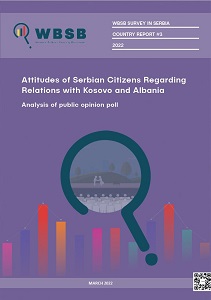Attitudes of Serbian Citizens Regarding Relations with Kosovo and Albania
Attitudes of Serbian Citizens Regarding Relations with Kosovo and Albania
Analysis of public opinion poll
Author(s): Maja Bjeloš
Subject(s): Politics / Political Sciences, Politics, International relations/trade
Published by: BCBP Beogradski centar za bezbednosnu politiku
Summary/Abstract: Relations between Serbia and Kosovo are currently reduced to the EU-facilitated talks in Brussels. The long-stalled talks went “back on track” after the appointment of EU Special Representative Miroslav Lajcak. The resumption of the dialogue was influenced by a different US approach to the Balkans following the presidential election and the appointment of Special Envoy Gabriel Escobar. Despite the international community’s strong desire for the leaders of Serbia and Kosovo to return to the negotiating table, it seemed that Serbian President Aleksandar Vučić and Kosovo’s Prime Minister Albin Kurti were unwilling to take a step forward. Their first meeting in June 2021 in Brussels was not encouraging, as it revealed personal animosities that threatened to bring the dialogue to another impasse. With an accession perspective that includes no date, i.e. without a tangible ‘carrot at the end of the stick’, leaders seem less motivated to make bold decisions. The actors were more engaged in the production and management of a crisis than in taking an effort to reach a final solution and progress towards EU membership. All in all, ten years after the dialogue began, there is little room for optimism as relations between Serbia and Kosovo are now at their lowest level. Many agreements have not been fully implemented, while the implementation of Brussels’ provisions concerning the association of Serb-majority municipalities is still pending.
Series: Beogradski Centar za Bezbednosnu Politiku - POLICY PAPERS
- E-ISBN-13: 978-9951-799-57-7
- Page Count: 18
- Publication Year: 2022
- Language: English
- eBook-PDF
- Table of Content

